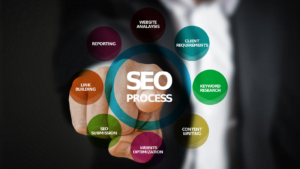Ecommerce On Page SEO | Guide to Ecommerce Websites

What Is Ecommerce?
Ecommerce is a business model in which businesses sell goods and services online. This can be done through websites, Facebook, or even through email.
The product name and services sold can be anything from clothes to car rentals.
The main reason for selling these items online is that it is cheaper and easier than selling them in brick-and-mortar stores.
Another great advantage of ecommerce is that it allows businesses to reach a much wider audience than they would if they were to sell their products directly to a potential customer.
There are many types of ecommerce businesses, but the most popular ones are those with a large customer base. These include Amazon, Walmart, and eBay.
There are also a lot of small ecommerce companies that get by without much help from their larger counterparts, but this will become more important as time goes on.
What Is On-Page Seo?
On-page SEO improves your website’s visibility using organic search engine optimisation (SEO).
This term has become used more generally in recent years as web admins increasingly realise that there are other ways to increase traffic and ranking on search engines, such as paid search and social media marketing.
Organic search engine optimisation (SEO) is a process that helps improve your website’s visibility by using Google analytics or organic search results.
Web admins can optimise their websites for better rankings by creating a good mix of on-page SEO and off-page SEO tactics. This often includes working with an SEO company to help you create a comprehensive SEO plan.
Ecommerce On-Page Seo Content
On-page content is one of the most important aspects of an ecommerce website. It is responsible for providing your customers with the information they can use to purchase.
This can be accomplished by providing information about your product description, describing them in detail, and including images or videos.
There are a variety of ways to create on-page content. You can use keywords or phrases to help your customers find what they’re looking for or include specific information about your ecommerce product page that will entice them to click through to your ecommerce site.
The quality of on-page content influences the success of an ecommerce website.
Suppose you’re unable to provide high-quality information and images. In that case, your customers will likely leave after trying to purchase something only to find out that it’s not what they expected.
Category Pages
Creating an online store makes sense to create a category page. Categories are important for SEO as they help your website rank higher in search engines.
By creating a category page, you can easily identify the products belonging to that category and ensure your ecommerce site is fully optimised for search engine results pages (SERPs).
Meta Title & Description
Meta titles for an ecommerce website should be descriptive and provide helpful information about the business.
For example, “The Most Comprehensive Ecommerce Guide” could be a meta title for an online store that provides comprehensive information about online selling, including SEO tips and advice.
Additionally, keywords used frequently on the website should also be included in the title.
Website Structure
When creating an ecommerce website, a few things must be considered to optimise the site for search engine optimisation (SEO). One of these factors is website structure.
A well-structured ecommerce website will help improve your product’s visibility and make it more likely that people will click through to your store from different sources.
In addition, well-formatted websites are easier for search engines to index and rank higher on global search engines.
eCommerce SEO Strategy

Optimising Your Product And Category Pages For Search
The first step to on-page SEO for eCommerce is to identify your product and category pages.
Once you have these pages, you can start optimisation work by identifying relevant keywords associated with your product and category.
You can then use those keywords in your titles, product descriptions, and other site elements to help promote your products.
Additionally, you can use search engines to improve the visibility of your pages by adding relevant keyword density and optimising for certain words or phrases.
Improving Your Site Structure And Navigation
Start by creating a well-stocked website to showcase your products or services.
This will help customers find what they’re looking for and help potential customers learn more about you and your product or service.
- Next, use keywords in your titles and descriptions to help searchers find your site faster.
- Add hostnames and domain extensions to identify different parts of the world where you sell products or services.
- Use keywords throughout your site to improve click-through rates (CTRs) and organic search traffic from Google search console, Yahoo! and other search engines.
- Keep track of the search engine rankings for your site so you can make changes as needed to ensure higher traffic levels from these engines.
Perform A Technical Seo Tool Site Audit
Every business must ensure its online presence is top-notch and visitors can easily find what they’re looking for.
Technical SEO has become increasingly important as the internet continues to evolve, making it more difficult for any site to rank higher in search engine results pages (SERPs).
While there are many ways to do technical SEO tools, a comprehensive site audit should be a key part of any business’s ecommerce SEO strategy.
A complete site audit will consider your website’s design, functionality, and user experience. This way, you’ll be able to identify areas where you can improve your overall ranking on SERPs and ensure your customers can easily find what they’re looking for.
Monitor Your Results
As an ecommerce business, it is crucial to have on-page SEO to improve your traffic and visibility. You can perform this in some ways, but one of the most effective methods is using a search engine optimisation (SEO) service.
A basic understanding of how SEO works can help you determine whether or not a service is the right fit for your business.
- First and foremost, SEO services require data collection to produce valuable results. This requires regular measurement of your website’s competition and tracking changes on all pages to identify potential optimisations that could make a difference.
- Secondly, these services must be properly managed to provide consistent quality results.
Conclusion
There are many factors to consider when creating an ecommerce website. One important factor is search engine optimisation (SEO).
SEO allows your website to rank higher in search engines, which will help you sell more products.
To optimise your site for the Google search engine, you must understand SEO.
Was this article helpful? Let us know in the comments.
FAQ
How do you do ecommerce SEO for product pages?
To optimise a product page title for SEO, start by creating a list of your product’s most popular search terms. These terms will help you determine the content most relevant to those searching for your product.
Next, ensure you complete all the SEO elements on each page title of your site. This includes placing your title tags in an appropriate location, adding images and data correctly, and ensuring that internal links point to a separate page on your site.
How do I write SEO for my product?
When creating SEO for your products, it can be difficult to decide what to do. You could spend hours researching different techniques or go with a tried and true method that has worked in the past.
But if you want your product to rank high in search engines, you must find a way to write great SEO copy. Here are some tips on how to do this:
- Start by understanding your product and why people might want it. This can help give you a good idea of the types of searchers that are likely to visit your website.
- Identify what keywords should be placed first in a search engine result page (SERP). Once you know the bread-and-butter keywords that searchers are looking for, you can start writing strong content around those keywords.
What are the most common issues for on-page SEO?
When it comes to on-page SEO, many factors can affect a website’s success.
Some of the most common issues include inconsistent keyword research, lack of link building, and poor hexing.
To overcome these problems, it is important to have a solid understanding of how each one works.





